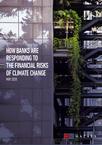How banks are responding to the financial risks of climate change
The Covid-19 outbreak brings into sharp relief the need to address sustainability risks and improve societal resilience. In its Renewed Sustainable Finance Strategy, which is open for consultation until 15 July 2020, the European Commission sends a clear message: the pandemic has not postponed European long-term sustainability objectives. The EU’s sustainable finance agenda will in fact be a crucial factor in the economic recovery in response to Covid-19 and the financial sector will play a key part in mobilising the necessary capital.
Against this background we have analysed how 30 of the largest banks worldwide have been handling climate-related financial risks by consulting their most recently publicly-disclosed information. The objective of this study is to assess the extent to which banks have integrated climate change in the areas of governance, risk management, scenario analysis and disclosures, and their level of readiness for recent and upcoming climate-related supervisory expectations.
Download our full study here to learn more about how some of the largest banks worldwide are responding to the financial risks of climate change.


